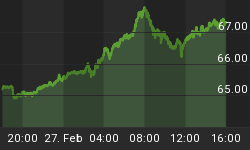War, information technology and disinformation have a long established relationship. It was Baron Rothschild who cleaned up at the Battle of Waterloo. Having exclusive use to the internet of the day - carrier pigeons - he had an early warning of the result. Ordering his minions openly to sell British Government bonds he precipitated a panic bear run amongst the ancestors of today's red braces brigades - and then quietly bought into the panic. Prices, of course, quickly reversed and recovered when the real result of the fighting was known.
Today's markets are no better. The technology has moved on but fear and greed, rumours and disinformation from participants and governments alike still drive today's participants as those of yore. Nothing demonstrates this better than the mass panic of the thundering herds back into the markets globally last week on one of the Baron's other dictums that "it is time buy when the blood is flowing in the streets" in order to "get in the new bull market".
Much of the action can probably be explained by hedge fund covering of bear positions. Governments in the US, the UK and Euroland facing possible calamities in their insurance, banking and pension fund industries applied some 'influences' on participants through nods and winks and regulatory changes.
Undoubtedly, some time has been bought as evidenced by the relief rallies. But the same was true in Japan and Korea during their decade and a half bear markets through their 'price keeping operations' or buying by government pension funds, through nods and winks and regulatory changes.
It did not work in Asia - the Japanese market is a mere 20 percent of its level at the peak 13 years ago. Korea is a fraction of its value at the time of the Seoul Olympics in 1988 - despite the economy being three times as large today.
With that history as background are the global economy and markets facing a new nirvana? We remain sceptical, to say the least. The imbalances within the US economy remain huge. The twin deficits are back and growing and the US consumers are struggling under record debt levels, as the job outlook grows more threatening.
The hope must be that there will be 'quick war' and the overthrow of the Iraqi regime objective. If oil prices are driven back the low $20 range and remain there this would provide the equivalent of a huge tax cut to the global economy and stimulate growth.
But this sort of analysis fails to look at the longer-term perspective. It is reasonable to argue that the global economic and security regime is in the early stages of adjusting to changed priorities of the American hyperpower. The Bush Administration, with its new imperial ambitions, has downgraded the interlocking network of global alliances and international organisations centred on the UN in the present crisis. The increased concerns about security and enhanced domestic priorities in the post 911 environment means that the high point of globalisation may have passed its peak and there are many early signs that the US is likely to become increasingly protectionist and unilateralist in the years ahead.
After all, we have been here before. August 1914 marked a previous high in an earlier form of globalisation. Lord Keynes talked about the English gentleman who ate his breakfast in bed, clothed in pyjamas made from Chinese cotton under blankets made from Australian wool, whilst drinking Indian tea, eating toast made from Canadian wheat and managing his portfolio of US industrial shares and Argentine bonds. It took only four years to destroy that and almost eighty years to get back to something resembling the status quo ante.
Uncertainties will remain until it is clear where the new American priorities lie. What is the longer-term agenda after Iraq and will it survive the present war? Will Richard Perle's and Paul Wolfowitz' Agenda for a New American Century become official policy? Iraq, after all, is only one third of the so-called 'axis of evil'. North Korea, despite the Administration's protestations not to worry remains a huge and ever growing problem that has the potential to destabilise and wreak havoc on the North East Asian region that includes China, Japan, South Korea and Taiwan. It will have to be addressed in the next few months if the nuclear genie is not to get totally out of hand in the vitally important economic sub-region.
The red braces brigade has had a good profitable week and can probably expect a few more. But the three years' bear market reflects fundamental global imbalances and changing strategic priorities. Aiming a few thousand cruise missiles at Baghdad may feel therapeutic and reduce some short term uncertainties but does not resolve fundamental underlying issues.















